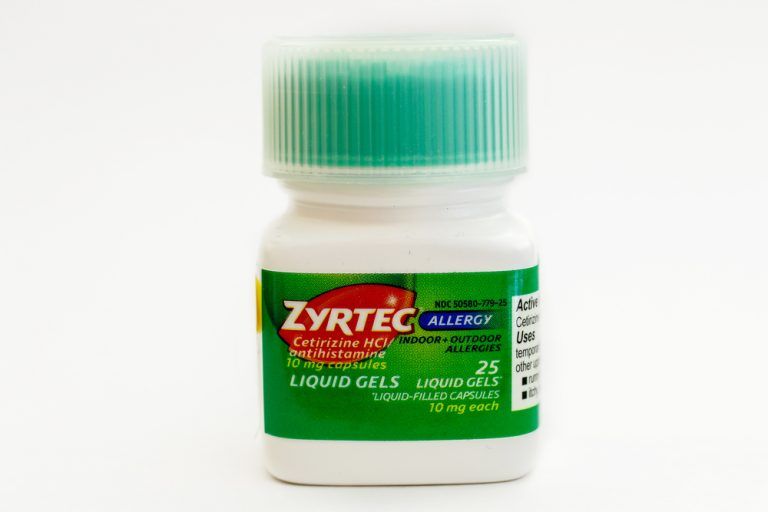How Long Zyrtec (& Other Antihistamines) Takes to Work
Allergies caused by airborne pathogens can cause symptoms that are annoying in the best of circumstances. In some cases, these symptoms decrease productivity and quality of life. Over-the-counter (OTC) medications like Zyrtec and other antihistamines can quell symptoms of allergies. (Learn More) They can be especially helpful for people who experience allergies that affect their nasal airways and sinuses. These medications have limited capacity to help people who develop skin reactions. Zyrtec generally takes about an hour to work. (Learn More) You need to follow directions when you take antihistamines, just as you would with a prescription medication. Be aware of possible side effects, so you know what to expect. (Learn More)

How Zyrtec & Antihistamines Work
According to Mayo Clinic, some people are allergic to substances or items that are normally harmless. Your body creates histamines, a substance that stick to cell receptors. This is what causes your immune system to have a reaction that makes your body believe something is bad for you, even when it is not. In some cases, allergies can affect your skin, digestive tract, or sinuses. Zyrtec works to relieve symptoms of allergies caused by hay fever, also known as allergic rhinitis. This includes symptoms such as watery eyes, itchy nose, and sneezing. Some people may experience even more severe allergic reactions, such as difficulty breathing, swelling, and hives (skin reactions resembling rashes). Antihistamines like Zyrtec stop histamine from further causing symptoms of allergies. They are most effective in treating allergic reactions that affect your sinuses and airways. They may also be able to help patients who develop hives as long as they adjust their dose. The usual dosage of Zyrtec varies according to age.
For children 2 to 5 years old: 2.5 mg
For people who are 6 years old or older: 5 to 10 mg
People who have hives may benefit from larger doses of Zyrtec to deal with the problem. Healthline says that other common antihistamine brands are Allegra, Claritin, Benadryl (diphenhydramine), and Chlor-Trimeton.
How Long Does It Take for Zyrtec Work?
You can take Zyrtec everyday to better control symptoms. It is possible to take it as needed because it works within about an hour after ingesting it. The medication is meant to be long-acting, and its active ingredient is cetirizine. Other antihistamines such as Claritin take longer to work. Both Claritin and Zyrtec can act to fight symptoms of allergies for up to 24 hours.
What About Side Effects?
Medications like Zyrtec and other antihistamines can be a great asset for people who are dealing with seasonal allergies and allergic rhinitis. However, they can cause side effects. Some well-documented side effects associated with Zyrtec include the following:
Dry mouth
Dizziness
Diarrhea
Constipation
Abdominal pain
Headache
Fatigue
Drowsiness
Thankfully, the rates of the latter two symptoms are known to affect small pockets of patients (about 6 percent to 14 percent of patients, respectively). Drowsiness (common to antihistamines) is often the reason why it is important to monitor the use of this medication in children. Drowsiness and fatigue are not necessarily dangerous, but adults should avoid driving or operating heavy machinery when taking antihistamines. Make sure to monitor how you feel too. Though rare, some patients are known to have allergies to antihistamines.

Precautions
Healthline says people with asthma should avoid using Zyrtec. Be especially careful if you drink alcohol and want to use the medication for seasonal allergies or hives. Though not fatal, alcohol can worsen sleepiness in people who take Zyrtec and other antihistamines. If you take Zyrtec and your symptoms do not get better within 72 hours, or if the hives you develop last six weeks or longer, seek medical help. Patients should also seek medical help if they are not sure why they have developed hives. Patients who use bronchodilators such as theophylline should confirm their doctors know this before taking Zyrtec. Inform your doctor if:
You are breastfeeding, pregnant, or trying to get pregnant.
You have had liver or kidney disease.
You are currently taking other medications, supplements, herbal products, or vitamins.
You can keep eating the same things you normally would unless your doctor instructs you to change your diet while taking Zyrtec.
Frequently Asked Questions
How exactly do antihistamines like Zyrtec work?
Antihistamines work by fighting symptoms of hay fever and seasonal allergies. They combat histamines secreted by your body after an allergic reaction. This decreases the symptoms you may be feeling, such as sneezing, runny nose, and watery eyes.
How long or how often should I take this kind of medication?
Zyrtec is meant to provide 24-hour relief. The same is true for other antihistamines like Claritin. Other antihistamines work differently than Zyrtec. Make sure to follow the directions on the box. Zyrtec can be taken every day to mitigate allergy symptoms before they start, but it can also be taken once you confirm seasonal allergies.
Are there side effects I need to know about?
Antihistamines are known for causing drowsiness. As a result, do not take alcohol after an antihistamine, and avoid driving. Common side effects of Zyrtec and other antihistamines include vomiting, headaches, dry mouth, fatigue, and headaches. Diarrhea and constipation can also occur.
References
Using Zyrtec for Treating Hives and Allergies. (May 2019). Verywell Health.
Allergies. (January 2018). Mayo Clinic.
Popular Over-the-Counter Oral Antihistamine Brands. (April 2018). Healthline.
Diphenhydramine. (August 2018). MedlinePlus.
Cetirizine. (January 2018). MedlinePlus.
Zyrtec vs Claritin for Allergy Relief. (April 2017). Healthline.

Related Articles

Saw Palmetto for Hair Loss: What the Science Shows
Saw palmetto is a small tree that grows in southeastern...

Metformin & Hair Loss: What Does the Science Indicate?
Metformin is a treatment for type II diabetes. One of the...

Using Tretinoin for Wrinkles and Aging (Dosage & Other Info)
Tretinoin is a retinoid, a class of vitamin A-based drugs...

Pros and Cons of Trintellix vs. Other Antidepressants
Trintellix is an atypical antidepressant medication...
